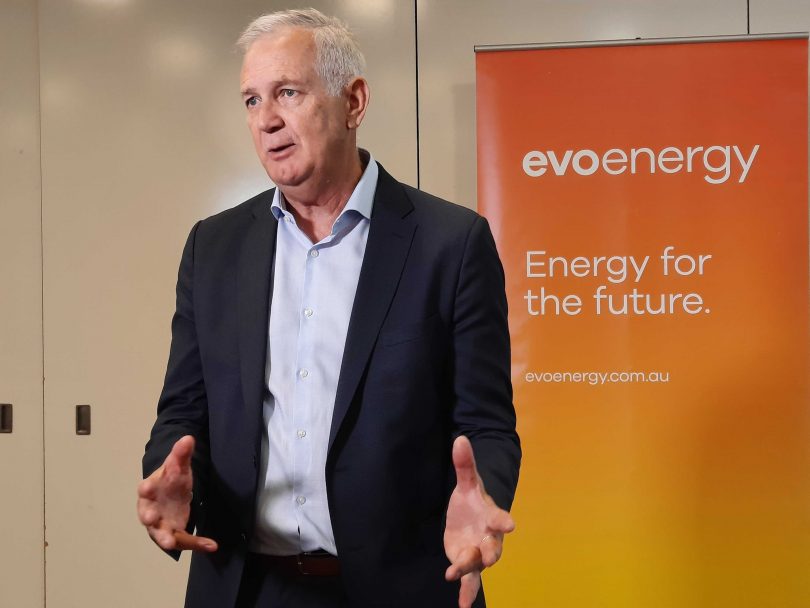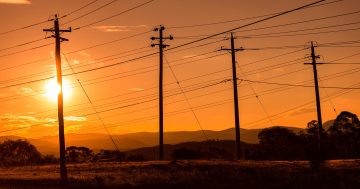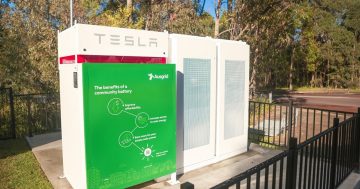
Evoenergy General Manager Peter Billing explains the coming price rises. Photo: Ian Bushnell.
The falling price of wholesale electricity due to the impact of renewable generation and the ACT’s 100 per cent renewable energy scheme have collided to ironically produce an expected big hike in ACT bills from July.
Under Evoenergy’s pricing proposal for the next financial year, average residential customers face a 36 per cent rise (around $5 a week) in the network charge on their electricity bill, while average businesses will be hit with a 41 per cent rise in network charges (around $32 a week).*
Big business will face a 46 per cent rise in network charges (around $7,300 a week).
Evoenergy says it has no control over the so-called ‘jurisdictional charges’ to do with the large-scale Feed-in Tariff scheme associated with the ACT’s contracted solar and wind generators providing the Territory with 100 per cent renewable electricity.
General manager Peter Billing said that with the electricity spot price falling over the past 12 to 18 months, Evoenergy now has to make up the difference between the spot price and the higher contracted price.
“So if the spot price is lower than the contracted price, then we’re actually paying the difference between those two prices, which is on behalf of the ACT Government, and the only way that we can recover that is back through our network charges,” he said.
“This isn’t part of our business operation, it’s something that we administer on behalf of the ACT Government, and therefore any of the contract arrangements are things we have no control over.”
Mr Billing said the proposal to the Australian Energy Regulator was not an ambit claim and Evoenergy could not absorb the difference.
He said Evo understood customers’ frustration at the price increases, and it would support vulnerable users such as pensioners as much as possible.
It had flagged the possible impact of the falling spot price to the government last year.
Minister for Energy Shane Rattenbury said the COVID-19-induced recession had also played a role in the falling spot price which had led to a more than tripling in the cost of the renewable energy scheme from around $42 million per year to $127 million this year.
“Because of our ‘contract for difference’ arrangement, where we guarantee the renewable energy generators a fixed price for the electricity they generate, this leads to an increase in the price of meeting our 100 per cent target,” he said.
“When wholesale prices are higher than this amount, we save money, and when they are lower than this price, we pay the difference between the two, which is passed through in electricity bills.”
Mr Rattenbury said the exact price increases would not be known until May when the Australian Energy Regulator assesses Evoenergy’s proposal, but he believed they would be less than the predicted $5 a week.
“The current estimate is that the cost for the typical household will increase from $1.94 per week to $5.65 per week, an increase of around $3.70 per week or $192 per year,” he said.
“This is still largely in line with the original projections of the total scheme cost, which was $5.50 per household per week.”
Mr Rattenbury said the ACT had benefited from lower electricity prices for years due to contracted renewable electricity supply being cheaper than wholesale electricity prices.
“The cost of the ACT’s Feed-in tariff scheme has been well below forecast levels for several years, which has resulted in lower household electricity costs than would have otherwise occurred, returning savings through lower electricity bills,” he said.
Mr Rattenbury said the ACT would remain comparable with other jurisdictions, even when the anticipated cost increase is taken into account.
He said assistance was available to vulnerable users, such as the utilities concession of $700 per year for pensioners.
“We will continue to work with Evoenergy to keep the cost of electricity as low as possible,” he said.
But the Canberra Liberals have called the looming bill hikes another broken promise from the government.
“Last year, the Chief Minister and the leader of the Greens promised Canberrans that they would see cheaper electricity costs on their bills due to the ACT Government’s investment in renewable energy,” said Ms Lee.
“The Labor-Greens Government said Canberrans would see a decrease of about $43 on the annual electricity bill of the average ACT household for 2020-21. We now find out prices will rise on average $5.50 a week – almost $300 per year.
“The government needs to be upfront and tell Canberrans what they will do to keep power bills affordable.”
For those needing help, further information is available on the ACT Government’s Assistance website.
To inquire about a cheaper energy plan, go to www.energymadeeasy.gov.au.
* It was originally reported that residential bills would rise overall by 36 per cent but Evoenergy has clarified that this percentage only refers to the network charges, as does the figures for commercial customers.
Original Article published by Ian Bushnell on The RiotACT.







